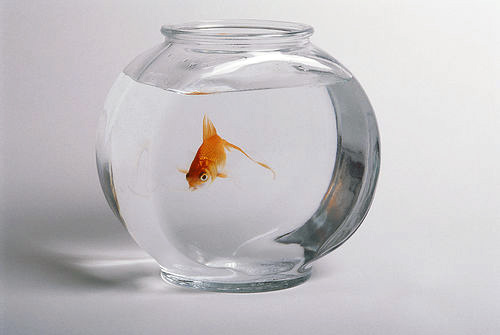Physicist: Probably nothing. We do know that the universe doesn’t need anything to expand into, and we haven’t seen any evidence that there is anything outside of the universe. But there has still been some speculation.
In the last hundred years physics has gotten pretty weird, and defining “universe” has become a little tricky. So, in what follows I’m defining the universe as “all the places that could be connected to one another by a sufficiently long rope” (never mind how the rope got there).
Having never been outside of the universe, it’s hard to discuss it with any certainty. Most of the theories about the outside of the universe fall into the “I can’t say you’re wrong for sure” category.
We can say that space isn’t “made of anything”, and that it doesn’t need any kind of “higher space” to exist in. If space did need some other kind of space to live in, you find that the question just gets pushed back. After all, what’s outside of that space?
In a conversation about spacetime often as not you’ll have some unpleasant and unrepentant jackass drawing parallels to rubber or sheets or something else material. It’s not that these metaphors are misleading (although they are a little) it’s that they reinforce the quiet, underlying assumption that space is made of something, and that it needs somewhere to be. About the best definition of space is “Space is nothing more and nothing less than what rulers measure”. If you think about some of the properties of space, as described in relativity (both general and special), you find that it has all kinds of properties that a material can’t have.
For example, there’s no difference whatsoever between moving and being stationary. So, it’s impossible to meaningfully talk about “moving through space”, when you may as well be motionless. Even worse, you can fit an arbitrarily large amount of space within any volume (as measured from outside that volume). Think: Dr. Who’s TARDIS. Or, if that’s not your thing: the diameter of a circle drawn around the volume can be arbitrarily great, while the circumference stays finite.
Point is: space isn’t stuff. And the universe doesn’t need anything to expand into.
When you picture the universe as a whole it’s almost impossible not to think of a fish bowl or a bubble.
Implicit in that picture of the universe is an outside. However, that outside is defined in terms of space, and all of space should be inside the universe. When you try to talk about the outside of the universe you find yourself asking questions like “okay, where are you?” or “how far from the universe are you?”, you know, the types of questions that really rely on some notion of position and space.
That all being said, there are some theories that do talk about things outside of the universe. There are some proponents of M-theory who claim that the universe could be a sheet floating in a higher dimensional space, and that there are other universe-sheets floating along side us, just a tiny distance away. Although the other sheets act exactly like what almost everybody would call “other universes”, it’s would be slightly more accurate to say that the collection of sheets and the higher space they float around in are all part of the same “super-universe”. They’re still at least a little connected to each other.
Aside: Btw, when physicists want to talk about more than three dimensions they (being born and bred here) like to knock off dimensions to help picture things. So, if you want to imagine the universe in a higher dimensional space, just get rid of a dimension. The universe goes from a 3-D volume to a 2-D “sheet”.
The universe may also have “bubbled off” of some other larger universe, or spontaneously started, or who knows. If there are truly other universes, or any other stuff outside of our universe, it’ll be “causally separated” from everything going on here (or that has or ever will go on here). Rather than thinking of other universes as being “somewhere else” it’s better to think of them as “in every way independent”. You can’t even sensibly talk about “going there”.
Science (and more generally: everything we can know), being based on observation, inference, and experience, can’t say much about things entirely outside of the universe. We can infer, and make some spectacular guesses, but that’s about all. In another 20 years or so our entire approach to the nature of the universe will have completely changed (it always seems too).








63 Responses to Q: What is the universe expanding into? What’s outside the universe?